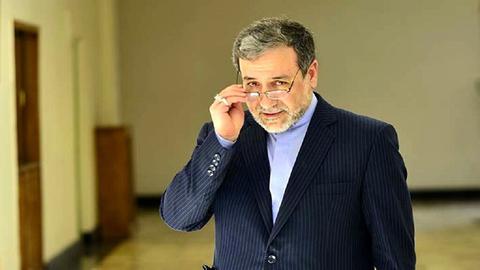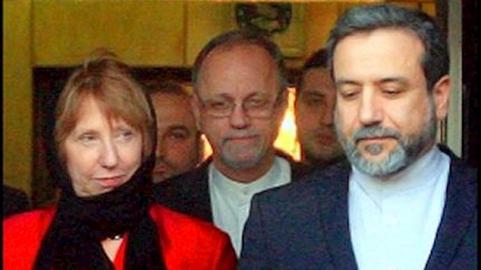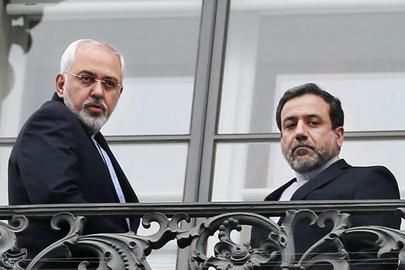As the Iranian currency continues to plunge amid the country's increasing isolation and nationwide protests, people close to the government have suggested that Abbas Araghchi could join the negotiations to revive the 2015 nuclear deal between Tehran and world powers.
They hope that this rumor will boost the diplomat’s credibility and help halt the decline of the rial against hard currencies.
Under the landmark 2015 nuclear agreement, the Islamic Republic agreed to restrain its atomic program in return for relief from economic sanctions.
But former US President Donald Trump in 2018 abandoned the accord and started re-imposed crippling sanctions on Iran. Tehran has since been rolling back its commitments in violation of the deal
It has been almost two years since the start of the negotiations to revive the pact, officially called the Joint Comprehensive Plan of Action (JCPOA), and there have been no concrete results so far.
Araghchi was the chief nuclear negotiator until the end of Hassan Rouhani's government in 2021.
Supreme Leader Ali Khamenei has sharply criticized the results of the talks, calling the proposed agreement unacceptable and impossible to implement.
This served as a clear indication that Khamenei, who has the final say on all important state matters, was not interested in reaching an agreement, and there is little chance he may change his views.
At the time, the draft agreement consisted of three texts: "Actions of the Islamic Republic to limit the nuclear program," "Actions of the United States to lift sanctions," and "A new addition to the JCPOA to compensate for Iran's non-compliance."
The then-foreign minister reported to parliament that the ground was prepared for the revival of the JCPOA.
Who Is Araghchi?
Let’s look at Araghchi’s record before determining whether he could help build the foundations for a new agreement.
He joined the nuclear negotiating team of the Islamic Republic during a period when Saeed Jalili - the secretary of the Supreme National Security Council and current representative of Khamenei in this council - was the chief negotiator.
The negotiations lasted nearly two years, and for the first time, the United States, China, and Russia participated.
This period of talks, during which Araghchi was deputy foreign minister, was one of the most unproductive and fruitless for the Islamic Republic.
Catherine Ashton, the head of the European Union's foreign policy at the time, recently published her memoirs entitled "And Then What."
She recounts that in one of the final meetings, when the 5+1 group of countries presented their proposals for an agreement, Jalili, who was a candidate for the presidential election, shrug his shoulders off and rejected the proposals.
During the debates ahead of the 2013 presidential election, which Rouhani won, Ali Akbar Velayati severely criticized Jalili, his electoral rival, for wasting time and being unable to negotiate.
While Jalili was negotiating with the 5+1 group, Khamenei authorized secret negotiations between the Foreign Ministry and the United States, which were held face-to-face in Oman.
None of the well-known diplomats of the Islamic Republic was present for the public during these negotiations which led to the JCPOA deal.
The negotiations were successful because of Khamenei's agreement.
Throughout this period, Araghchi remained a member of the negotiating group and, despite his sullen personality and dry spirit, succeeded in reaching an agreement and have sanctions lifted.
Prior to joining the Foreign Ministry, Araghchi was a staff member of the Islamic Revolutionary Guards Corps.
After graduating from the Faculty of the Foreign Ministry, he became the ambassador to Japan during the presidency of Mahmoud Ahmadinejad.
Upon his return, he became a deputy foreign minister and retained this position until the end of Rouhani's presidency.
During the same presidency, Araghchi's nephew Ahmad became a vice president of the central bank. Amid escalating internal disputes over the fall of the rial, Ahmad was arrested and ultimately sent before a Revolutionary Court.
Araghchi was later appointed as secretary of the Strategic Council of Foreign Relations, a move that was criticized by supporters of Raisi's government.
Since leaving his post as deputy foreign minister, Araghchi has made sporadic comments in public and has written a book about Iran-Japan relations.
He praised Khamenei in one of his speeches, demonstrating his continued loyalty to the supreme leader.
The 83-year-old ruler of Iran has entrusted Araghchi to lead the nuclear negotiations, which could in turn benefit Raisi’s government, considered by Iranians to be one of the weakest in the country’s recent history.
But reaching an agreement on reviving the JCPOA relies solely on Khamenei.
visit the accountability section
In this section of Iran Wire, you can contact the officials and launch your campaign for various problems



























comments